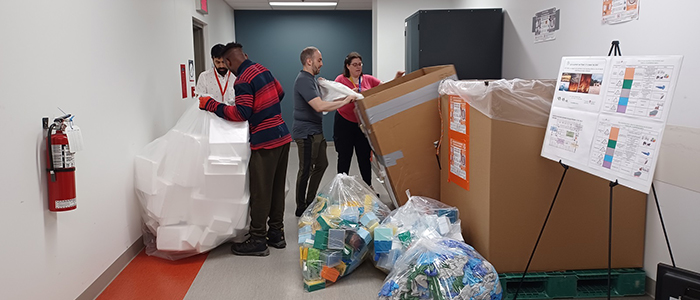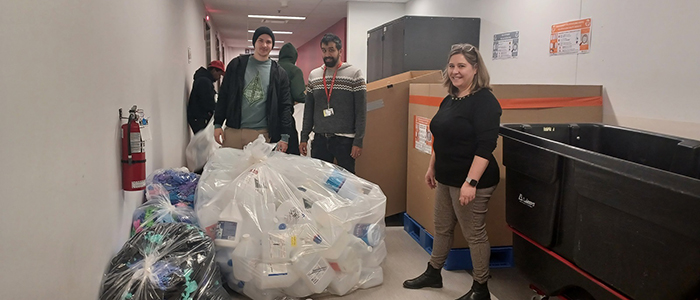
Breadcrumb
- News and Events
- News
- Content
- RI-MUHC expands recycling to new heights
null RI-MUHC expands recycling to new heights
Impressive cooperation from research programs brings new success to the RI-MUHC waste recycling and sustainability efforts
SOURCE: RI-MUHC
October 2, 2024
The 2030 Vision for the Research Institute of the McGill University Health Centre (RI-MUHC) builds a path to the organization’s future, including a commitment to becoming more environmentally responsible. Important steps in turning this vision into reality are underway, one of which is to handle our waste more responsibly.
Recycling lab ware
One of the concrete actions being taken to “green” the RI-MUHC is the development of a recycling program in the laboratories. Begun on a pilot scale in 2023, lab ware recycling at the RI-MUHC has now expanded to include all six research programs at the Glen site.
The RI Sustain team, part of the RI-MUHC Technical Services Division, is guiding the program, supported by the Environmental Health and Safety team and many motivated research program volunteers, known as Ambassadors. Everyone’s goal is to safely and effectively recycle significantly more lab ware, thus reducing the amount of waste sent to landfill.
The RI-MUHC recycling program currently focusses on five types of lab ware - pipette tip boxes, Styrofoam boxes, glassware, disinfectants, and nitrile gloves.
In each research program, clearly labelled bins provide instructions for what can and cannot be placed in each bin. The recycling Ambassadors regularly verify the contents of the bins to ensure contaminants are not included.

“This year, we are focussing on recycling specific items of non-biohazardous lab ware,” says Tania Estephan, Project Coordinator, Technical Services and member of the RI Sustain team. “For now, other items are considered contaminants, but we are planning a new pilot project that will expand our scope.”


According to the August 2024 report from our external recycling partner MultiRecycle, 1,248 kilograms (2,751 pounds) of lab ware have been recycled since the program began in March 2023. Thanks to the diligence of our Ambassadors and our community, none of the items sent to MultiRecycle ended up in landfill—100% were successfully recycled.
On all RI-MUHC research floors in the E Block of the Glen site, teams have access to bins for recycling gloves, Styrofoam, glassware, and two types of plastics. Posters with material-specific instructions are displayed on the walls and bins are colour-coded by material type. Special thanks to our ambassadors for their help with the designs!

The RI Sustain team has not forgotten about the Montreal General Hospital (MGH). “Space is the big concern at the MGH,” says Nia Tsatas, BRaIN Project Coordinator and member of the RI Sustain team. “Much less space is available for the large bins needed to collect recyclable materials, particularly Styrofoam. We are working on this and plan to start with smaller bins for glass and polypropylene. We hope to be up and running with laboratory recycling at MGH before the end of this year.”


More than just lab ware!
The Technical Services team has expanded its recycling efforts beyond lab ware to include a broader range of materials. For example, during the RI-MUHC’s annual spring laboratory cleanup in April, which commemorates Earth Day, a variety of unwanted research equipment is recycled.
Thanks to our expert partner MultiRecycle, discarded materials like medical equipment, electronics, furniture, and metals are efficiently diverted from landfills. In their August 2024 report for the RI-MUHC, MultiRecycle proudly noted that 12,505 kg of waste was successfully triaged for recycling during Earth Day activities over the past two years.

"We know there is still a lot to accomplish, but we can take pride in the increasing number of sustainability initiatives at the RI-MUHC," says Rami Tohme, director of the Technical Services Division at the RI-MUHC and a member of the MUHC Sustainability Working Group. "Additional goals include using energy more efficiently, safeguarding our natural environment, and managing our resources in a more sustainable way."
Anyone with ideas and interest in these projects is welcome to contact the RI Sustain team at ri.sustain@muhc.mcgill.ca.
Related news
Earth Day 2024 at the RI-MUHC: Towards greater sustainability
RI-MUHC laboratory wins the International Freezer Challenge at McGill University